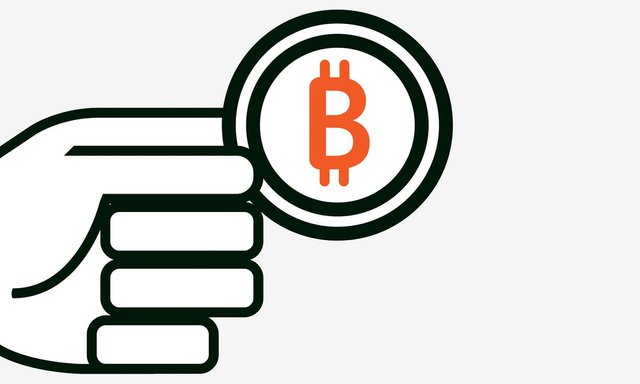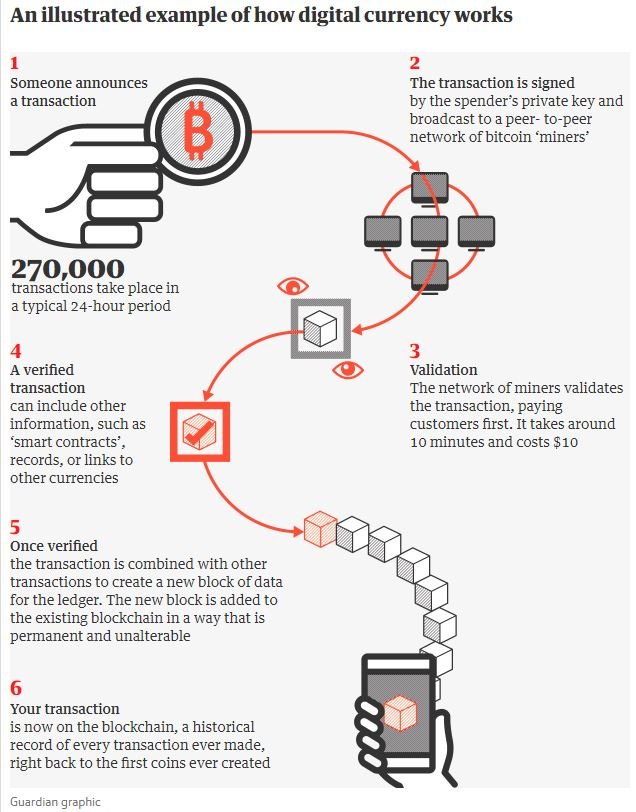Bitcoin and cryptocurrencies – what digital money really means for our future
Digital currencies such as bitcoin have caused a financial frenzy. Alex Hern explains what they are – and whether this is the end of ‘real’ money

What is a cryptocurrency? Is it like bitcoin?
In a word, yes. Bitcoin was the first cryptocurrency, and is still the biggest, but in the eight years since it was created pretenders to the throne have come along.
All of them have the same basic underpinnings: they use a “blockchain”, a shared public record of transactions, to create and track a new type of digital token – one that can only be made and shared according to the agreed-upon rules of the network, whatever they may be. But the flourishing ecosystem has provided a huge amount of variation on top of that.
Some cryptocurrencies, such as Litecoin or Dogecoin, fulfil the same purpose as bitcoin – building a new digital currency – with tweaks to some of the details (making transactions faster, for instance, or ensuring a basic level of inflation).
Others, such as Ethereum or Bat, take the same principle but apply it to a specific purpose: cloud computing or digital advertising in the case of those two.
What exactly is a bitcoin? Can I hold one?
A bitcoin doesn’t really exist as a concrete physical – or even digital – object. If I have 0.5 bitcoins sitting in my digital wallet, that doesn’t mean there is a corresponding other half sitting somewhere else.
What you really have when you own a bitcoin is the collective agreement of every other computer on the bitcoin network that your bitcoin was legitimately created by a bitcoin “miner”, and then passed on to you through a series of legitimate transactions. If you want to actually own some bitcoin, there are exactly two options: either become a miner (which involves investing a lot of money in computers and electricity bills – probably more than the value of the bitcoin you’ll actually make, unless you’re very smart), or simply buy some bitcoin from someone else using conventional money, typically through a bitcoin exchange such as Coinbase or Bitfinex.
A lot of the quirks of the currency come down to the collective agreement about what constitutes “legitimacy”. For instance, since the first bitcoin was created in 2009, the total number in existence has been growing slowly, at a declining rate, ensuring that at some point around 2140, the 21 millionth bitcoin will be mined, and no more will ever be created.
If you disagree with that collective agreement, well, there’s nothing stopping you from splitting with the wider network and creating your own version of bitcoin. This is what’s known as a “fork”, and it’s already happened multiple times in the past (that’s what competitors such as Litecoin and Dogecoin are). The difficulty is persuading other people to follow you. A currency used by just one person isn’t much of a currency.
What can I actually do with cryptocurrencies?
In theory, almost anything that can be done with a computer could, in some way, be rebuilt on a cryptocurrency-based platform. Building a cryptocurrency involves turning a worldwide network of computers into a decentralised platform for data storage and processing – in effect, a giant hive-mind PC (that this no longer sounds like it has much to do with “currencies” is part of the reason some instead suggest the name “decentralised apps” to cover this sector).
We’ve already seen proposals for YouTube clones, collectible card games and digital advertising exchanges built on top of cryptocurrencies: “x but on the blockchain” is the new startup pitch du jour, now that “Uber for x” and “x but on the iPhone” are passé. There’s already Dentacoin (Yelp for Dentists but on the blockchain), Matchpool (Tinder but on the blockchain) and even Cryptokitties (Tamagotchis but on the blockchain).
In practice, however, the available uses are rather more limited. Bitcoin can be used as a payment system for a few online transactions, and even fewer real-world ones, while other cryptocurrencies are even more juvenile than that. The excitement about the field is focused more on what it could become than what it actually is.
Source: TheGuardian
https://www.theguardian.com/technology/2018/jan/29/cryptocurrencies-bitcoin-blockchain-what-they-really-mean-for-our-future